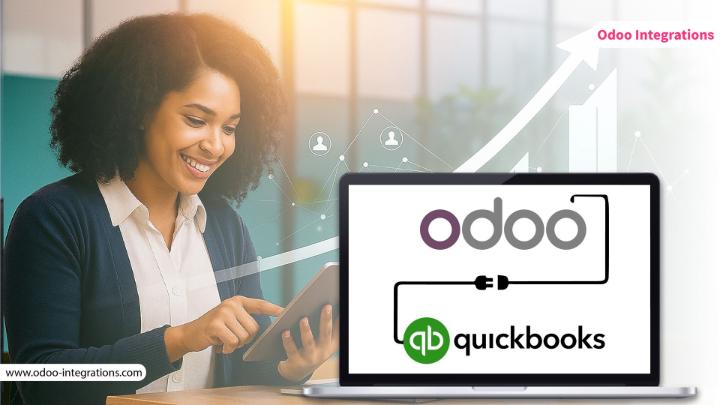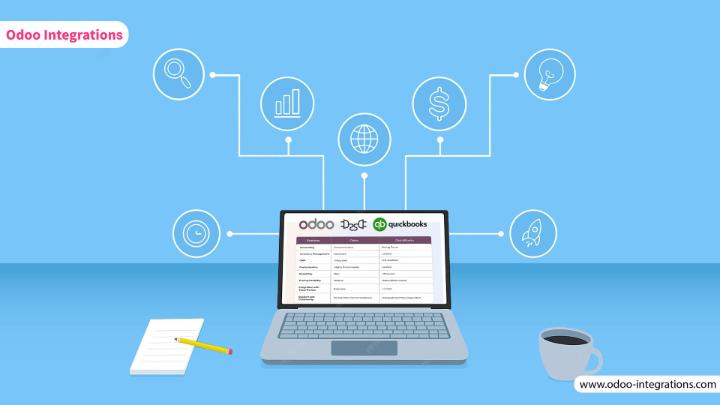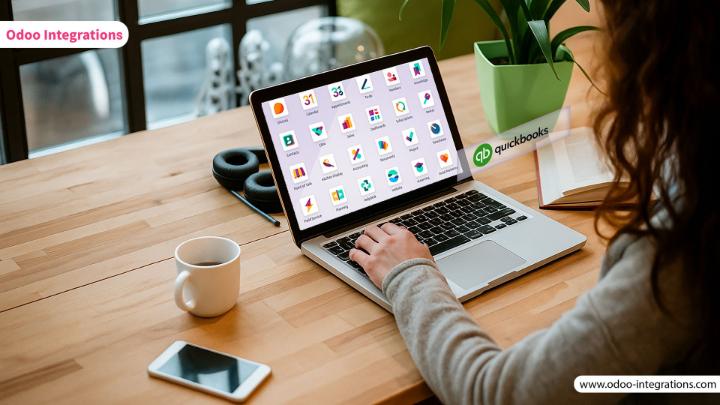Why Growing Businesses Rely on Odoo–QuickBooks Integration for Financial Accuracy
Handling finances successfully is the most crucial part of executing a prosperous business. Still, many organizations find it difficult to deal with manual reconciliation, duplicate entries, and scattered data across various platforms. At the time when accounting systems are detached from operations, the result is presented as financial errors, inefficiencies, and blind spots.
Businesses that use Odoo ERP to handle their QuickBooks and operations for accounting, the solution lies within the Odoo Integration. This integration is responsible for filling out the gap between financial management and business operations, which ensures accurate reporting, complete financial clarity, and flexible workflows.

Why does Odoo QuickBooks Integration Matter?
Both QuickBooks and Odoo are strong in their own way:
QuickBooks - It is a trusted accounting software that is best known for handling payroll, financial reporting, and bookkeeping.
Odoo ERP - It is an extensive platform that manages inventory, CRM, supply chain, sales, HR, and more.
Whenever businesses use these features solely, they can come across certain difficulties:
- It will lack real-time visibility into business finances.
- It will make errors due to the unmatched data in accounts vs. operations.
- Major time gets wasted on reconciliation between accounting and sales.
- Individuals need to enter data for payments, invoices, and expenses between systems manually.
By combining the two, the businesses can attain a single source where all the financial data runs automatically from Odoo to QuickBooks, which gives decision-makers correct insights without much extra effort.
6 Key Features of Odoo and QuickBooks Integration
A well-executed integration creates a seamless flow of data between ERP and accounting. Key features include:
1. Automatic Invoice Synchronization-
- It speeds up billing and removes manual duplication.
- The sales orders are generated in Odoo and are automatically transformed into invoices in QuickBooks.
2. Payment and Expense Tracking-
- All the payments against invoices sync across both systems in real time.
- All the expenses are recorded in QuickBooks, which results in Odoo making sure the accurate costs get tracked.
3. Cost of Goods Sold (COGS) and Inventory Alignment-
- It helps in tracking COGS and profit flawlessly.
- The Odoo inventory movements are synced up with QuickBooks, which gives an exact financial value of stock.
4. Tax Handling and Multi-Currency-
- All the tax details are recorded in Odoo and get synced up directly with QuickBooks for approval.
- It provides support for international businesses managing various currencies.
5. Real-Time Reports-
- All the decisions are based on real-time and accurate data.
- The business leaders tend to quickly view updated revenue, expense reports, and cash flow.
6. Vendor Data and Centralized Customer-
- It enables smooth communication and accurate financial reporting.
- Supplier and customer tend to record consistent stay between the systems.

What are the Benefits of Odoo–QuickBooks Integration?
Improved Accuracy- You are no longer required to re-enter expenses, sales, and invoices across the systems. The automated syncing makes sure that errors are removed through data accuracy that might otherwise cost money and time.
Time Savings- The most time-consuming project for finance teams is manual reconciliation. Through integration, businesses are able to save several hours every week, giving time that can be used for strategic decision-making.
Financial Transparency- The leaders can achieve full visibility in both financial and operational performance. No matter if it's analyzing revenue trends, forecasting cash flow, or monitoring receivables, the integration provides clarity.
Better Reporting and Compliance- The strength of QuickBooks lies in its financial reporting. With the Odoo data running smoothly, audits and compliance with tax regulations become easier.
Scalability for Growth- As the business grows, financial difficulty also increases. The QuickBooks and Odoo combination makes sure that scaling does not add manual work. It tends to support multi-currency, high-volume transactions, and multi-warehouse without any stress.
Enhanced Cash Flow Management- When expenses, payments, and invoices are tracked in real-time, the businesses get a clear image of their cash flow, which allows them to make better operational and investment decisions.
How Odoo–QuickBooks Integration Works?
The integration is a two-way bridge between the two systems.
1. Data Mapping-
Sales, invoices, customers, and expenses are synchronized between Odoo and QuickBooks.
2. Synchronization-
- When a sales order is completed in Odoo, an invoice is automatically created in QuickBooks.
- Conversely, payments entered in QuickBooks update back in Odoo.
3. Centralized Management-
Finance departments view QuickBooks reports, while operations departments use Odoo, both tapping into the same reliable data.
4. Continuous Updates-
- Inventory transactions, customer changes, and costs update automatically, keeping both systems in sync.
- Integration is possible through out-of-the-box Odoo QuickBooks adapters or custom API connections based on the complexity of the business.

Is Odoo–QuickBooks Integration Right for Your Business?
If your company struggles with any of these issues, integration is the solution:
Squandering hours on tedious manual entry of data between Odoo and QuickBooks.
Dealing with incorrect or redundant financial information.
Frustrated with long lead times in reporting and decision-making.
Handling multi-location or multi-currency operations.
For companies that seek to have financial clarity, velocity, and scalability, having these two systems integrated is imperative.
Conclusion
Financial transparency is the key to intelligent business choices. With the integration of Odoo ERP and QuickBooks, businesses close the loop between operational optimization and financial precision. The outcome is automated workflows, real-time visibility, and a future-proof business that's capable of expanding without worrying about finance blind spots.
In today's B2B world, success isn't just about sales anymore, but about how effectively businesses comprehend their figures. With Odoo-QuickBooks integration, you get that clarity, enabling you to remain agile, competitive, and prepared for whatever the future brings.